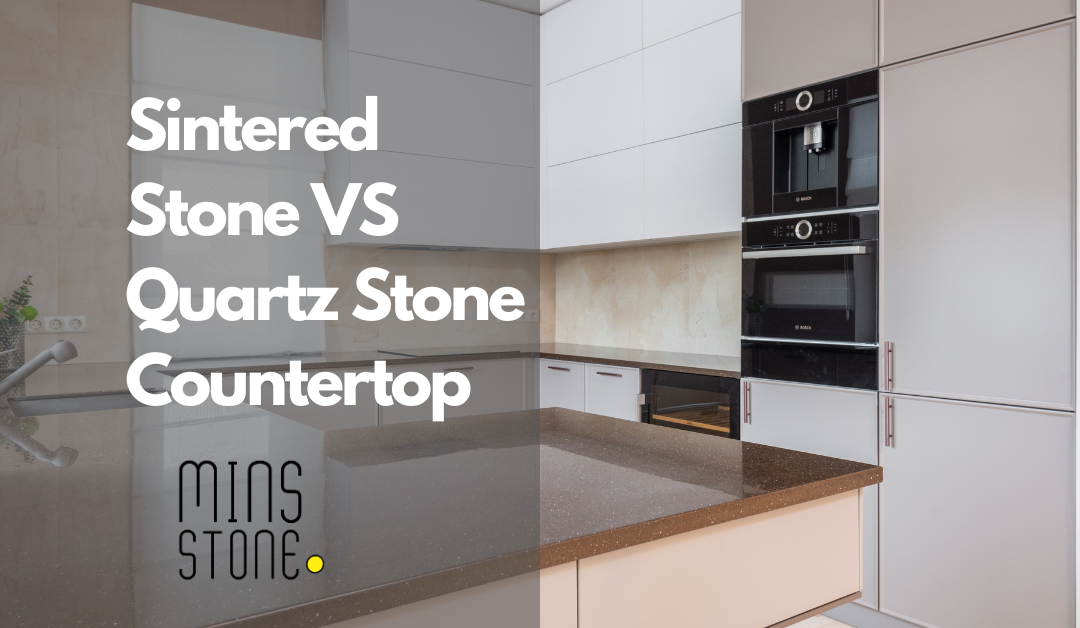In the quest to find the perfect countertop material for your kitchen or bathroom, sintered stone and quartz often emerge as top contenders. Both options offer a harmonious blend of durability, aesthetics, and functionality.
Sintered stone and quartz are two remarkable countertop materials, each with its own unique characteristics. But before you pick one of the two options, it helps to know the differences between sintered stone vs quartz.
Sintered Stone
Sintered stone, also known as engineered stone, undergoes a high-temperature manufacturing process resulting in a strong, non-porous surface.

These elements are subjected to a high-temperature sintering process, resulting in a dense, non-porous slab. This process mimics natural stone formation but with enhanced durability and performance. Sintered stone offers exceptional resistance to heat, stains, scratches, and UV light, making it an ideal choice for high-traffic areas.
Quartz Stone
Quartz countertops, on the other hand, combine natural quartz crystals with resins to create a durable, low-maintenance option.

In terms of aesthetics, sintered stone can mimic various natural materials, while quartz offers a broader range of colors and patterns.
Ultimate Showdown Sintered Stone Vs Quartz Stone – Pros & Cons
Both materials are durable and perform, resisting heat, stains, and scratches. Maintenance requirements are relatively low for both, though sintered stone may require periodic sealing. Pricing varies, with sintered stone generally being slightly more expensive. Now, let’s delve into the details and explore each aspect of the sintered stone vs quartz comparison.
Aesthetic Appeal: Sintered Stone vs Quartz
When it comes to aesthetics, sintered stone and quartz offer distinct advantages. Sintered stone can replicate the appearance of various natural materials, such as marble, granite, or concrete.

This versatility allows you to achieve the desired look and feel of natural stone while benefiting from the enhanced durability of the sintered stone surface. On the other hand, quartz offers a vast selection of colors, patterns, and textures, including options that closely mimic the elegance of marble or the rugged beauty of granite. Whether you prefer the sleek and modern appeal of sintered stone or quartz’s wide range of design possibilities, both materials offer ample choices to suit various styles and preferences.
Durability and Performance: Sintered Stone vs Quartz:
Durability is a key consideration when selecting a countertop material, and both sintered stone and quartz excel in this aspect.

Sintered stone exhibits outstanding resistance to heat, making it highly resilient to hot pans and pots. It also boasts impressive scratch resistance, ensuring your countertop remains pristine even with regular use.
Quartz, on the other hand, is equally durable, with high resistance to scratches, stains, and impacts. Both materials are non-porous, making them hygienic and resistant to bacteria growth. Whether you opt for sintered stone or quartz, you can expect a long-lasting countertop that can withstand the demands of daily life.
Maintenance and Care: Sintered Stone vs Quartz:
Maintenance requirements play a significant role in the selection process. Both sintered stone and quartz offer ease of maintenance, requiring simple cleaning with mild soap and water. However, there is a slight difference between the two when it comes to long-term care.

Sintered stone may require periodic sealing to maintain its pristine condition and further enhance its stain resistance.
Quartz, on the other hand, does not require sealing at all. Regular cleaning and prompt removal of spills are generally sufficient to keep your quartz countertop looking its best. Consider your lifestyle and the level of maintenance you are comfortable with when making your decision.
Pricing and Budget Considerations

Budget is an important factor for most homeowners when choosing countertop materials. The pricing of sintered stone and quartz can vary based on factors such as brand, color, and design complexity.
In general, sintered stone tends to be slightly more expensive than quartz. However, it is essential to consider the long-term value and benefits each material offers in relation to their upfront costs. Both sintered stone and quartz provide excellent value for their respective price points, ensuring you receive a durable and visually appealing countertop material.
Final Verdict: Choosing the Perfect Countertop Material
After a thorough exploration of sintered stone and quartz, it becomes evident that both materials offer remarkable features and benefits. The choice between the two ultimately boils down to your personal preferences, style requirements, and budget. Sintered stone impresses with its ability to replicate the look of natural materials and its superior resistance to heat. Quartz, on the other hand, provides a wide range of colors, patterns, and textures, along with exceptional stain resistance. Assess your specific needs, and consider the aesthetic appeal, durability, maintenance requirements, and budget constraints to select the ideal countertop material that will transform your kitchen or bathroom into a stunning space.
How Can Minstone Assist You?
We trust that you have found this comprehensive comparison between sintered stone tabletop and quartz stone countertops to be informative. At Minstone, we are dedicated to offering top-quality countertop materials for your home. Whether you are considering sintered stone or quartz, our team collaborates with reputable suppliers to ensure that you have access to the finest options on the market. Schedule an online consultation with Minstone today to discover how we can help you bring your dream home to life.
We greatly value your feedback! If you have any comments or suggestions, please don’t hesitate to contact us! We appreciate hearing from you and are always ready to assist you in any way we can.
Frequently Asked Questions (FAQ) About Sintered Stone vs Quartz Countertops
Can sintered stone or quartz countertops be repaired if damaged?
Both sintered stone and quartz countertops can be repaired by professionals specializing in countertop repairs. Minor scratches or chips can often be fixed seamlessly, ensuring your countertop maintains its beauty and functionality.
Can I place hot objects directly on sintered stone or quartz countertops?
Sintered stone and quartz are highly heat-resistant, but it is generally recommended to use trivets or hot pads to protect the surface from extreme temperature changes.
Are sintered stone and quartz countertops resistant to stains?
Both sintered stone and quartz countertops are highly resistant to stains. However, it is still advisable to clean spills promptly to prevent any potential staining.
Are sintered stone and quartz countertops suitable for outdoor use?
Sintered stone and quartz countertops are primarily designed for indoor use. Exposure to harsh weather conditions and UV rays may affect their appearance and performance over time.


